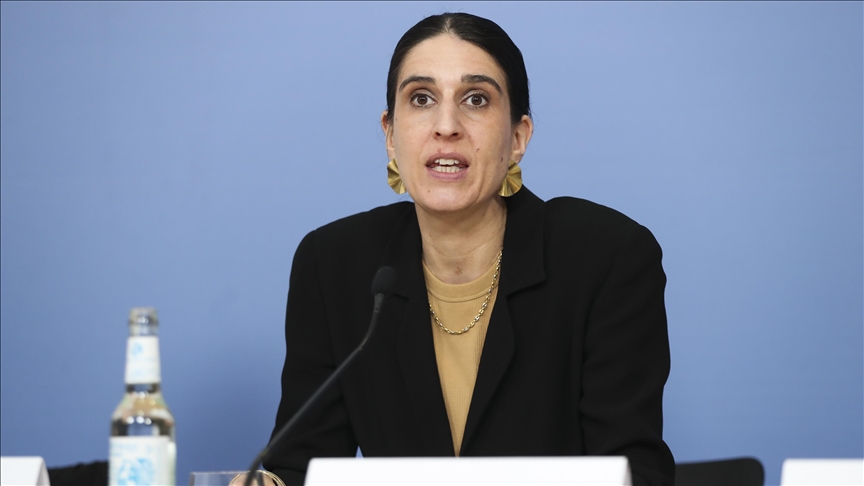Alarming Islamophobia in Germany: ‚ÄòEvery second person agrees with anti-Muslim statements‚Ä�
‚ÄòExtremely anti-Muslim sentiments‚Ä� are becoming increasingly pervasive in German society, says Rima Hanano, co-director of rights group CLAIM

- ‘Two-thirds of Muslims no longer trust politics … it weakens democracy, it weakens social cohesion,’ Hanano warns, calling for concrete action against Islamophobia
BERLIN
German authorities must take anti-Muslim racism more seriously and implement stronger measures to combat the rising number of attacks and discriminatory practices in the country, according to a leading rights group.
“We currently see extremely anti-Muslim sentiments in society. Every second person agrees with anti-Muslim statements,” Rima Hanano, co-director of CLAIM, told Anadolu.
Recent surveys show that Muslims are the least accepted minority in Germany, the EU’s largest economy and a country of 84 million people with more than 5 million Muslims. Many Germans were found to be harboring negative stereotypes and prejudices toward Muslims, while media coverage of international conflicts and terrorism has further fueled suspicion of the Muslim community.
In this deeply concerning political climate, anti-Muslim attacks and discrimination hit a record high in 2024, with Hanano’s organization documenting 3,080 anti-Muslim hate incidents last year – a dramatic 60% increase from 1,926 cases reported in 2023.
According to Hanano, the rise of the far-right Alternative for Germany (AfD) party and other right-wing movements, along with increasingly inflammatory political rhetoric, has emboldened individuals to become more aggressive and “feel justified” in attacking Muslims.
“We’re seeing how discourses and debates are drifting more and more to the far right. Many things are now being said that were previously unspeakable,” Hanano said, criticizing the widespread use of misleading stereotypes and false generalizations in politics and media.
“Muslims are often labeled as terrorists, or knife attackers. Islam and Muslims are repeatedly associated with security issues. In other words, they are made into a security problem, and this ultimately leads some individuals to feel justified in carrying out attacks and discrimination against others,” she said.
Need to ‘recognize and identify’ anti-Muslim racism
CLAIM’s annual report revealed an alarming escalation in physical attacks against Muslims last year: two homicides, three attempted murders, and 198 cases of assault.
The organization also documented 122 instances of property damage and over 70 attacks on mosques. Muslim-owned markets and restaurants were frequent targets of threats and violence.
Hanano, who has researched anti-Muslim hate crimes for more than a decade, believes the actual number of anti-Muslim incidents is much higher than reported, since many victims do not file reports.
“Those affected often simply don’t report anti-Muslim racism, their own experiences of racism. We know that only 4% of Muslims who experience discrimination actually report it,” she said.
Official police records, she added, also fail to capture the full scope of these crimes since authorities often categorize them merely as general offenses or insults.
“This means we need a much better understanding of anti-Muslim racism, and therefore, we also expect a unified definition. This is absolutely necessary for authorities to recognize and identify this racism,” she said.
Erosion of social cohesion and trust in democracy
Studies show that Muslims in Germany have been facing increasing discrimination in housing, education, employment, and interactions with government authorities.
This widespread discrimination, coupled with rising hate incidents, has led to a significant decline in their trust of political institutions.
The erosion of trust is particularly pronounced among Muslims who have faced sustained exposure to racist attitudes and discriminatory treatment.
“We see that anti-Muslim racism has an effect on those affected, but of course, also on society as a whole. Those affected lose trust – people are afraid, they feel isolated, they feel unheard and unseen,” Hanano said, adding that this leads to people losing trust in democracy, the government, and politics in general.
“Two-thirds of Muslims no longer trust politics, and this is naturally a problem because it has an effect on social cohesion, on democracy – it weakens democracy, it weakens social cohesion,” she warned.
Germany’s previous Social Democrat-led coalition government pledged stronger measures against far-right propaganda and racism, promising increased funding for civil society organizations and support centers.
However, since conservative Chancellor Friedrich Merz took power in May, many NGOs fear potential funding cuts as the new government prioritizes curbing irregular migration and enforcing tougher security measures to appeal to concerned voters, rather than supporting rights groups.
“Anti-Muslim racism must be taken seriously and recognized as a problem. And, of course, this requires a consistent political response,” Hanano said, adding that rights groups and support centers are calling for decisive political and legal action from the government, parliament, and regional authorities.
“We need, for example, better documentation both by civil society and through state institutions. We need better support structures and we also need a new action plan against anti-Muslim racism that specifically addresses the problem of anti-Muslim racism. This plan should also outline concrete, binding measures and must be implemented,” she said.
Anadolu Agency website contains only a portion of the news stories offered to subscribers in the AA News Broadcasting System (HAS), and in summarized form. Please contact us for subscription options.







